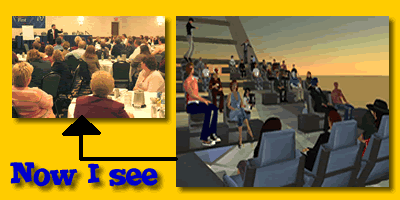McLuhan suggested that new media always have four effects: extension, reversal, obsolescence and retrieval. I see these effects occurring with this emerging, pervasive connectivity:
Extension: Being online anywhere and anytime will extend our sense of timing. We will feel more in tune with everything that's happening. Our minds will be more capable of wondering when to do something and what's going to happen next. It will become routine to experience what we now call "uncanny timing": being in the right place at the right time, happening along with fortuitous timing, experiencing synchronicities. We'll usually be prepared when the time comes. We'll consistently spend the right amount of time in time to make a timely comeback. Our sense of timing will be more powerful, reliable and important in our lives.
Reversal: Pervasive connectivity will over-extend Web 2.0 and cause it to lose devotees. We are taking social networking to an extreme where it will seem like too much of good thing. Getting bombarded by updates from friends and requests to be friends -- will induce burnout. Twitter and Facebook are leading the way from progress to reversal where it's evident how superficial networking: comes with the cost, does more harm than good or has reached the point of diminishing returns.
Obsolescence: Pervasive connectivity will retire broadcast models of distribution. Broadcast content will go straight to archive where it can be tagged, viewed when needed and linked to from other digital documents. Broadcasters will upload to servers just like all of us "amateur" content generators. Goodbye seat time, time slots, scheduled time, reruns and rescheduled times. Offerings that are timed by the constraints of the delivery source will be replaced by the timing of the customer, viewer, subscriber or learner. Content with no sense of the customers' timing will be obsolete.
Retrieval: Pervasive connectivity will retrieve "living under the stars". We will function in our worlds like shepherds and hunter gatherer cultures. We will live by our wits and sense of timing. We think like alphabets and printed pages have not fragmented and sequenced our perceptions. We be immersed in an acoustic, oral and aural world. We'll read the signs for changes and listen to the surroundings for perspective. We will learn from what happens, shows up and comes about -- to trust the timing of serendipity.








